A Dive Deep into 5 Fish We Love
May 27, 2024

Fish is a delicious and nutritious protein that often finds its way into healthy diets—and for good reason. It's a filling main dish packed with a wide range of nutrients. It’s also extremely versatile, affording home cooks and chefs the ability to create unique and tasty dishes that millions of people enjoy daily.Diet-to-Go’s chefs are no different. We include fish of numerous varieties on our menus, and we love to get creative with unique flavors and savory tastes that keep our customers satisfied while they work towards their weight loss goals.
Let’s dive deeper into the health benefits of five of the most popular kinds of fish and our delicious meals that feature them!
Tilapia
Tilapia is a popular farm-raised fish native to the Middle East and Africa. It typically has a mild, sweet flavor and flaky skin, although its taste can change dramatically based on where it is raised.Tilapia’s lengthy list of nutrients includes:-
Omega-3 Fatty Acids: For supporting heart health
-
Vitamin B12: For healthy blood cells
-
Niacin: For skin, digestive, and nervous system health
-
Vitamin D and Phosphorus: For improving bone strength
-
Selenium: For preventing cancer
Diet-to-Go tilapia dishes include: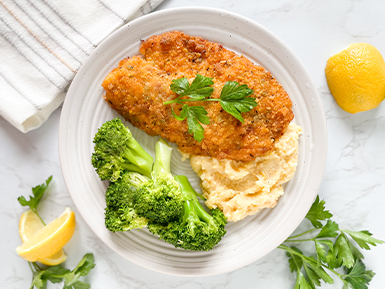
Herb Crusted Tilapia with Polenta and Broccoli
440 calories; 29g protein
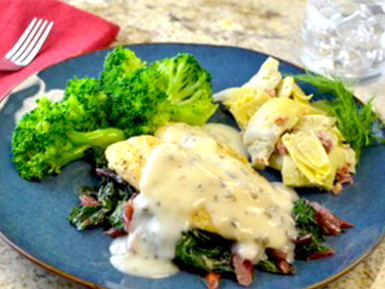
Lemon Herb Tilapia with Swiss Chard, Artichoke Mix and Broccoli Florets
440 calories; 40g protein
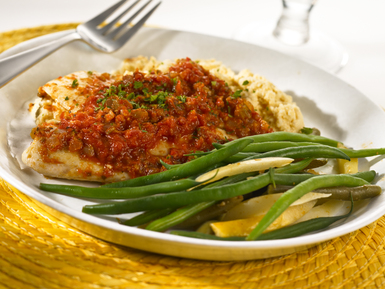
Tilapia Veracruz with Cauliflower Mash and Green Bean Mix
450 calories; 45g protein
Salmon
Salmon is a Pacific and Atlantic fish with many varieties that thousands of farms grow. Its pink color and flaky texture have a nutty, full, buttery flavor that makes it a popular choice worldwide— especially in the U.S.
Wild Pacific salmon are available at many supermarkets, as are farm-raised varieties. Wild Atlantic salmon is only available via farms as the U.S. has prohibited fishing due to overfishing and pollution.Salmon is packed with nutrients such as:-
Omega-3 Fatty Acids: For supporting heart health
-
Vitamin B12: For healthy blood cells
-
Vitamin B6: For brain function
-
Vitamin D and Phosphorus: For improving bone strength
-
Selenium: For preventing cancer
-
Potassium: For nerve, muscle, and heart function
Salmon is one of our favorite proteins. We have numerous dishes featuring it, including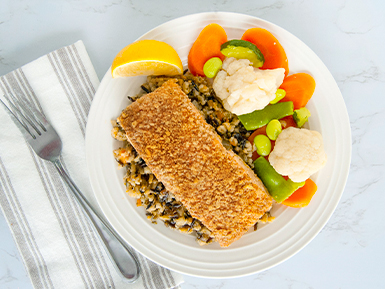
Herbed Baked Salmon with Veggie Blend and a Three Grain Rice Pilaf
360 calories; 28g protein
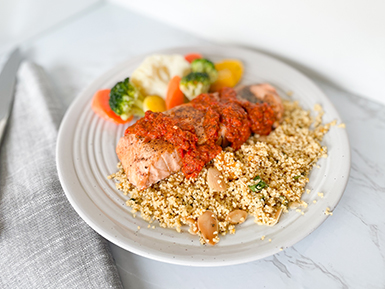
Harissa Salmon with Mandarin Orange Almond Cous Cous and a Veggie Blend
350 calories; 26g protein
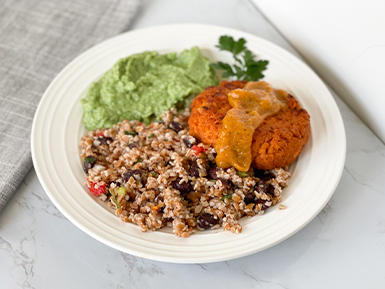
Salmon Cake over Rice Pilaf with Spinach Cauliflower Puree
380 calories; 23g protein
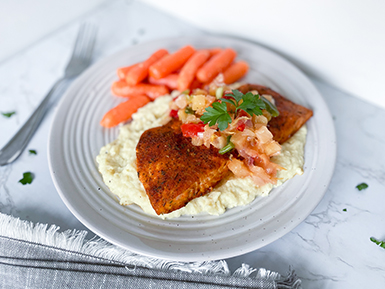 Baked Salmon with Pineapple Salsa, Turnip & Parsnip Veggie Puree and Ginger Carrots
Baked Salmon with Pineapple Salsa, Turnip & Parsnip Veggie Puree and Ginger Carrots
400 calories; 32g protein
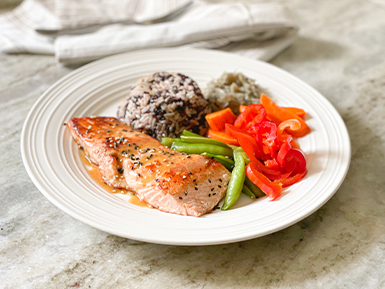
Salmon Teriyaki Rice Bowl
560 calories; 32g protein
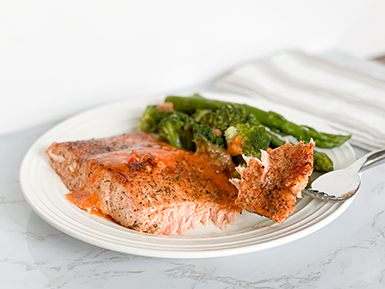
Baked Cajun Salmon with Asparagus & Broccoli and a Cream Sauce
310 calories; 33g protein
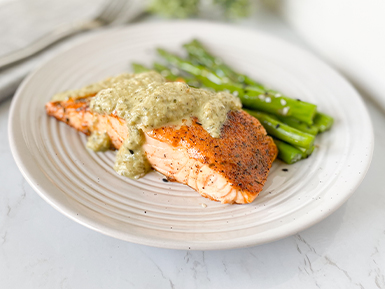
Chimichurri Salmon with Marinated Asparagus
540 calories; 34g protein
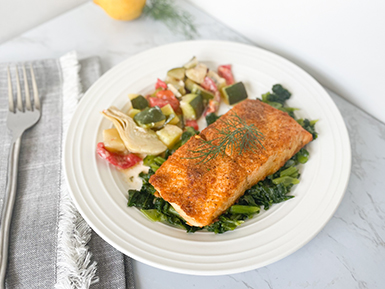
Cumin Salmon with Mustard Greens and a Zucchini Veggie Medley
390 calories; 37g protein
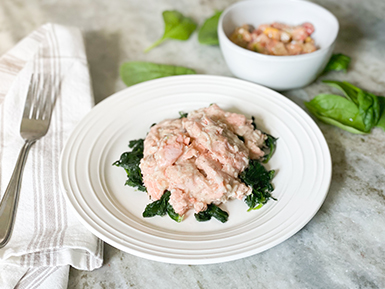
Salmon and Spinach Salad with Marinated Vegetable Blend
500 calories; 34g protein
Shrimp
Ah, shrimp — a staple in most people’s diet with reports saying the average American downs about 5 pounds per year, making it the most valuable seafood commodity in the country. These days, most regular and jumbo-size shrimp come from farms, although sometimes coastal fishermen catch them and sell them in markets.
You can find cold-water, pink shrimp, which are cooked and peeled, and warm-water shrimp that are pink, white, or brown, which can be cooked or raw.
Shrimp tends to have a watery, slimy texture, giving cooks more of a blank canvas to turn it into a scrumptious dish with a wide variety of flavor possibilities. It also pairs well with rice and noodles dishes.Shrimp’s nutrition benefits include:-
Potassium: For nerve, muscle, and heart function
-
Phosphorus and Calcium: For teeth and bone health
-
Iron: For efficiency in carrying oxygen to muscles and throughout the body
-
Copper and Zinc: For a strong immune system
-
Magnesium: For energy boosts
Diet-to-Go meals with shrimp include: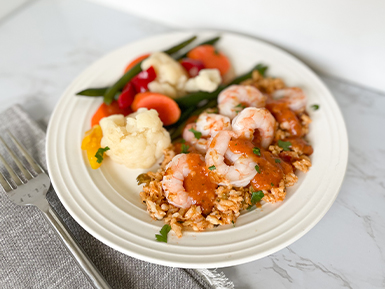
Spanish Shrimp and Rice
370 calories; 27g protein
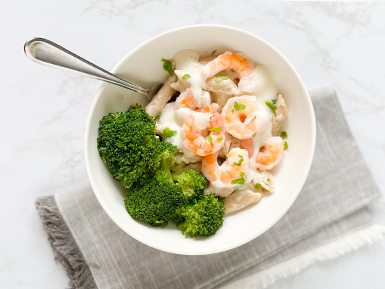
Shrimp Alfredo and Broccoli
510 calories; 37g protein
Tuna
Tuna is a saltwater fish populous in the Atlantic Ocean. It has a meaty, savory flavor that most people find extremely filling.
Albacore “white meat tuna” is a favorite at many sushi places, and Skipjack “light meat tuna” is often a star protein at fancy restaurants.
Like salmon and tilapia, tuna has a lengthy list of nutritional benefits:-
Omega-3 Fatty Acids: For supporting heart health
-
Vitamin B12: For healthy blood cells
-
Vitamin D and Phosphorus: For improving bone strength
-
Selenium: For preventing cancer
-
Potassium: For nerve, muscle, and heart function
-
Iron: For efficiency in carrying oxygen to muscles and throughout the body
-
Iodine: For a healthy metabolism
Tuna is also a lean protein that can help with weight loss, and we love to get creative with it in our dishes, which include:
Tuna Meltovers with a Peach Crisp with Walnuts
330 calories; 26g protein
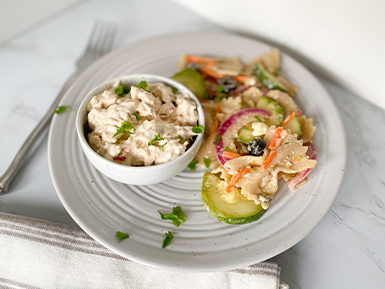
Greek Pasta Salad with Tuna
520 calories; 19g protein
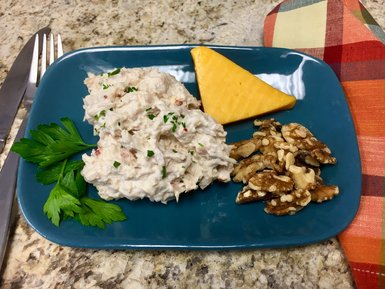
Tuna Salad with Cheddar Cheese and Walnuts
610 calories; 32g protein
Cod
Cod is a lean, low-fat fish often found in shallow waters that people have enjoyed for centuries. Its flaky texture and white color are well-known. After years of overfishing, cod is now protected and available at markets and restaurants nationwide.Cod has many vitamins and minerals to promote a healthy body and mind. They include:-
Omega-3 Fatty Acids: For supporting heart health
-
Vitamin B12: For healthy blood cells
-
Niacin: For skin, digestive, and nervous system health
-
Vitamin D and Phosphorus: For improving bone strength
-
Selenium: For preventing cancer
-
Choline: For regulating mood and improving memory
Diet-to-Go dishes with cod include: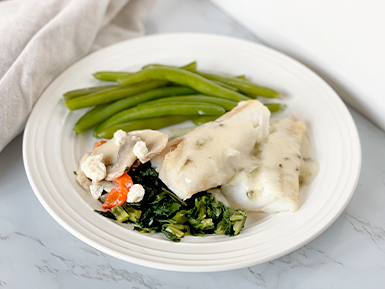
Boston Cod in Lemon Herb Sauce with Greens, a Red Pepper & Mushroom Blend, and Green Beans
420 calories; 41g protein
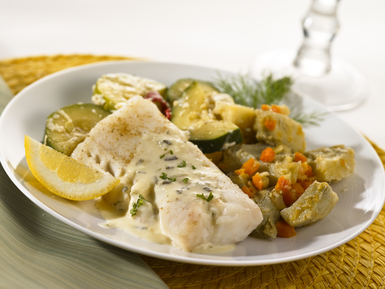
Cod Loin with Lemon Herb Sauce and Artichoke Barigoule, plus Zucchini Squash Blend
360 calories; 34g protein
Ultimately, fish is a tasty, nutritious, lean protein source with versatility that gives our chefs room to get creative — and the end result is something our customers love. You can view our sample menus with many more delicious dishes here.
------------------------------------------------------------------------------------
Author: Caitlin H
Diet-to-Go Community Manager
Caitlin is the Diet-to-Go community manager and an avid runner. She is passionate about engaging with others online and maintaining a healthy, active lifestyle. She believes moderation is key, and people will have the most weight loss success if they engage in common-sense healthy eating and fitness.
-




